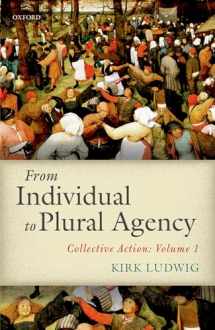
From Individual to Plural Agency: Collective Action: Volume 1
Book details
Summary
Description
Kirk Ludwig develops a novel reductive account of plural discourse about collective action and shared intention. Part I develops the event analysis of action sentences, provides an account of the content of individual intentions, and on that basis an analysis of individual intentional action. Part II shows how to extend the account to collective action, intentional and unintentional, and shared intention, expressed in sentences with plural subjects. On the account developed, collective action is a matter of there being multiple agents of an event and it requires no group agents per se. Shared intention is a matter of agents in a group each intending that they bring about some end in accordance with a shared plan. Thus their participatory intentions (their we-intentions) differ from individual intentions not in their mode but in their content. Joint intentional action then is a matter of a group of individuals successfully executing a shared intention. The account does not reduce shared intention to aggregates of individual intentions. However, it argues that the content of we-intentions can be analyzed wholly in terms of concepts already at play in our understanding of individual intentional action. The account thus vindicates methodological individualism for plural agency. The account is contrasted with other major positions on shared intention and joint action, and defended against objections. This forms the foundation for a reductive account of the agency of mobs and institutions, expressed in grammatically singular action sentences about groups and their intentions, in a second volume.


We would LOVE it if you could help us and other readers by reviewing the book
Book review



